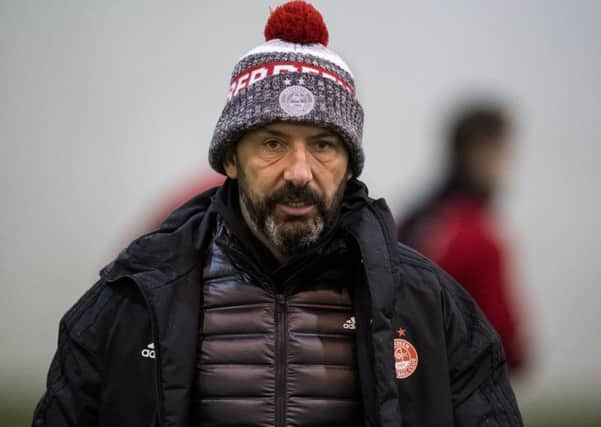Derek McInnes still feels '˜desperation' and '˜demand' for trophies


Yet, while Steven Gerrard might be on track to create that scenario down Govan way, 12 months down the line it is still McInnes who is taking the fight to an all-conquering Brendan Rodgers’ Celtic. The Betfred Cup final this afternoon, the first trophy decider of this campaign, follows on from the two clubs once more occupying first and second in the Premiership last season. That could represent some form of vindication over the decision McInnes made last December.
“I don’t really care how people perceive that,” the Pittodrie manager said. “I’m proud that Aberdeen – more than any team outwith Celtic in the last five years – has been every year in Europe, made seven semi-finals and four finals. Nobody else can touch that, and I’m proud of that.
Advertisement
Hide AdAdvertisement
Hide Ad“We’ve now got another cup final to look forward to. I see the opportunity to manage Aberdeen as a real privilege and, while I feel the weight of responsibility to keep being competitive, it’s tough.
“When we won the League Cup, it was the club’s first trophy for almost 20 years. The anticipation of that, and the desire and desperation from our support, for us to finally win a trophy again was clear. Now we’re four and a half years on from that and I still feel that desperation and demand to win. But that’s what happens when you manage a club like Aberdeen. The demand is there. You need to accept that responsibility.”
It is McInnes’ misfortune to be Scottish football’s answer to Andy Murray. In his era he has found himself up against opposition with unprecedented abilities to hoover up trophies: reflected in Rodgers’ men becoming the first team to complete a double-treble. The country’s tennis great, meanwhile, surely would have more than three slams to show for a stellar career had he not found himself ranged against arguably the sport’s three more ravenous competitors ever in Roger Federer, Rafael Nadal and Novak Djokovic.
“Eras are eras,” said McInnes, whose four finals in five years is as many as Aberdeen reached in the two decades before he took charge. “You are put up against who you’re up against. People said to me often enough: ‘once Hearts, Hibs and Rangers are back in; Aberdeen will be back [down]’. We’ve still been second, still qualifying for Europe and still getting to cup finals.
“We’ll be criticised if we lose on Sunday, we get criticised if we lose finals. We accept that criticism but at least we are getting criticised for getting to finals. Other clubs don’t get the same criticism and don’t even get to the finals. We get to finals, put ourselves in a position to be competitive.
“So the era is what it is. We were expected to get pushed aside a couple of years ago when everybody was back in. Finishing second a and winning a cup [in 2013-14] didn’t really count because Rangers weren’t really at it and Hibs and Hearts were struggling away, but we’re still there, still getting to finals and we still finished second last year and they [Rangers] have been back up for a couple of seasons now. It’s tougher and tougher to maintain that. To maintain it for the last five or six years has been tough, to maintain it beyond that is the challenge we all face. But I’m actually really enjoying the challenge and regardless of who is manager of Rangers, Celtic, whoever and regardless of what teams you play, I’d like to look back in the future and think we did a lot of good work at Aberdeen and hopefully there are more trophies to show for it.”
In order for McInnes to be regarded as a truly transformative presence at Pittodrie, more tangible evidence is required than a League Cup clinched on penalties against Inverness Caledonian Thistle. Yet it would be an injustice if appreciation of his efforts from the Aberdeen faithful ultimately proved more strained than it really ought to be.
“You’re never going to please everybody all the time,” he said. “We’ll look back on this time as a strong period for the club. But like everything else, to be really remembered and recognised you probably have to win more trophies. I get that and I would be the same.
Advertisement
Hide AdAdvertisement
Hide Ad“I want this to not just be a strong era where a lot of good was done; becoming debt-free, moving to a new stadium and training ground eventually, dragging the club into the modern era. We’ve done that. We’ve got a team of value on the pitch and had four players in the last Scotland squad, and one with Northern Ireland as well. So we’ve dragged the club up to a level where it hadn’t been operating for a long time.
“But it’s always: what’s next? The challenge is always there. I’m proud of the fact that every other manager wishes they were preparing their team for a cup final. Every other set of players and fans would love to be going into a final. So it’s important we all remember that. I’m grateful for the opportunity to win a trophy and my players will be doing all they can to achieve that.
“We have to keep showing that enthusiasm, that perseverance and that determination . That’s key in any walk of life but especially in football.”